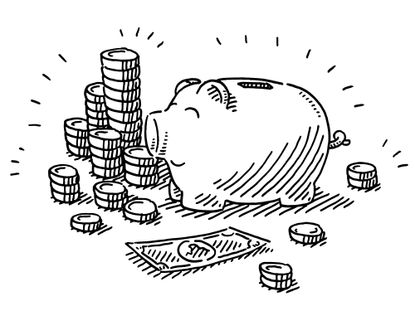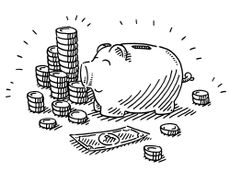Teaching children about money: the dos and don'ts
Teaching children about money is essential to ensure they are well-equipped for managing their finances in the future


A report by the Money Advice Trust and the National Debtline into young people's borrowing habits found that earlier financial education could have a significant impact on young people.
They have advised the government to begin financial education in primary school and for financial services, like banks, to increase their financial education services.
But what can parents and family members do to help children learn about pounds and pennies?
From real life to play time, these dos and don'ts could help kids get financially savvy.
(MORE: Bank accounts for kids)
DON'T… Let them use your debit or credit card
Giving your child financial responsibility is one thing, but giving them access to your debit card or credit card is another.
While it's great to teach children practically, they'll need a safety net. Instead of trusting them with your bank details, give them their own child-friendly bank account or debit card instead.
Look After My Bills Newsletter
Get the best money-saving tips, tricks and deals sent straight to your inbox every week. Make sense of your money in partnership with The Money Edit.
GoHenry is a bank account and card especially for children, which allows you to transfer pocket money and savings straight into their account.
Parents get an account too, so they can see how kids spend their money in real time, set spending rules and decide where they can use their card.
A pre-paid debit card for under-18s, Osper also offers transparency, built-in spending limits and parental approval.
Parents can order an Osper card and attach their own debit card to it to easily load money onto the card.
DO… Use real life
Teaching children about spending money can be easy if you use real life scenarios, reckons Jo Wiltshire, parenting expert for Childcare.co.uk.
"Use your everyday life to get your child used to dealing with money and the value of things. Let them help you make shopping lists and budget for a supermarket shop," says Wiltshire.
You could also encourage them to cut and use money-off coupons, or set up a play shop or imaginary restaurant at home so they can mimic what they see you do in real life.
Visiting your local bank is another way of teaching children the importance of savings and how things like ISAs and investments work.
A number of banks have their own financial education programmes to help children of all ages learn how best to use and spend their money, including RBS MoneySense, Barclays MoneySkills, Lloyds' Money for Life and Nationwide Education.
Metro Bank also runs its own financial education programme, where children can learn about creating a budget and visit the bank itself.
A Metro Bank spokesperson said: "Teaching children how to use, spend and save money are vital skills that will help them into adulthood and at Metro Bank we're proud to support schools by educating children about the importance of looking after their money."
DON'T… Start too late
It's important not to underestimate you child's capacity to learn, and financial education can start as soon as they begin to demand new toys or sweets.
It could just be giving them change to buy their own bag of sherbet lemons at the corner shop or pocket money to wash the car, but it's never too early to get started.
"Previous generations often felt money was only for adults, and children grew up with no money skills at all. These days, they are able to shop at younger and younger ages – so those skills need to be part of growing up," says Wiltshire.
DO...Make it age-appropriate
Starting simply is a must. A young child will be thrilled with a cool money box, and will love role-play games. A six-to-eight year old can have a savings account, and will enjoy a trip to the bank with you.
Older children can start to budget their own pocket money, and add to it by doing chores, selling old toys, or doing a summer job.
DON'T… Expect them to learn in school
Financial education became compulsory in schools in England in 2014, but that doesn't mean your child will be taught to the level they should.
While some schools provide long-term lessons as part of personal social education (PSE) lessons, some only include financially orientated sessions for a few hours each year.
DO...Lead by example
"Teaching children about your own experiences with money and letting them see how you deal with money is the easiest way for them to learn," says Wiltshire.
"Teach them that it's cool to be in control of your money. Don't let it control you. Show them how a credit card works, and interest, and discuss how it might be better to spend money you have rather than money someone is lending you."
If you're having money troubles and you're not sure how to handle it in front of children, Clare Francis, savings and investments expert at Barclays, believes that honesty is the best policy.
"I think most parents want to protect their children as much as possible but equally not lie to them. If your financial circumstances change and it has a negative impact on what you can and can't do as a family, it's important to explain to children that something has happened and that some cutbacks may have to be made.
"Children shouldn't have to worry and stress about money problems. However, understanding the concept of money and what having it, or not having it means, is important."
As a freelance content marketer and copywriter, Emily has over five years of experience working with household brands & start-ups alike. She writes articles on insurance, energy, travel and personal finance.
-
 Three energy firms pay £8m in switching compensation - has your provider paid out?
Three energy firms pay £8m in switching compensation - has your provider paid out?More than 100,000 customers have received compensation after changing providers, but is now a good time to switch energy suppliers?
By Tom Higgins Published
-
 Save £300 on your supermarket shop with cashback accounts
Save £300 on your supermarket shop with cashback accountsBanks, credit card companies and cashback sites are all offering cashback on your supermarket shop, but can you use them all to max out your savings?
By Vaishali Varu Published
-
 Bank accounts for kids: a complete guide to the best ones to start them saving
Bank accounts for kids: a complete guide to the best ones to start them savingWe explain your options and the top accounts for kids to choose
By Cathy Hudson Last updated
-
 4 great ways to start saving for grandchildren
4 great ways to start saving for grandchildrenNot sure how best to put money aside for your grandkids? We explain the options
By Katie Binns Last updated
-
 Why setting up a kid with a bank account helps them understand money
Why setting up a kid with a bank account helps them understand moneySetting your child up with a bank account is a great way to teach them about money management
By Rachel Wait Last updated
-
 Savings accounts for babies — starting early is the next big thing
Savings accounts for babies — starting early is the next big thingSavings accounts for babies can be a great idea and help set your child up for the future
By Rachel Wait Last updated
-
 Pocket money: what to give your kids and how to make them earn it
Pocket money: what to give your kids and how to make them earn itPocket money can help children learn about money management and responsibility so managing it correctly is essential.
By Rachel Wait Last updated